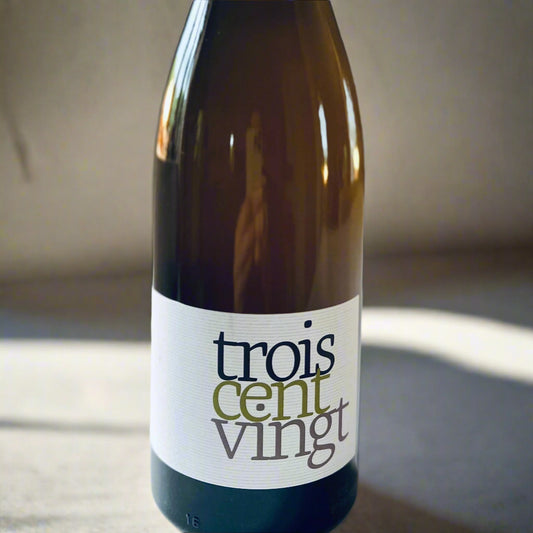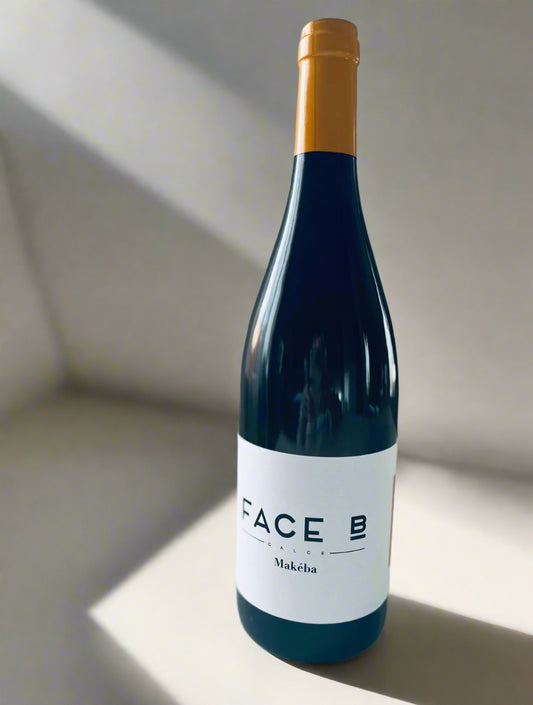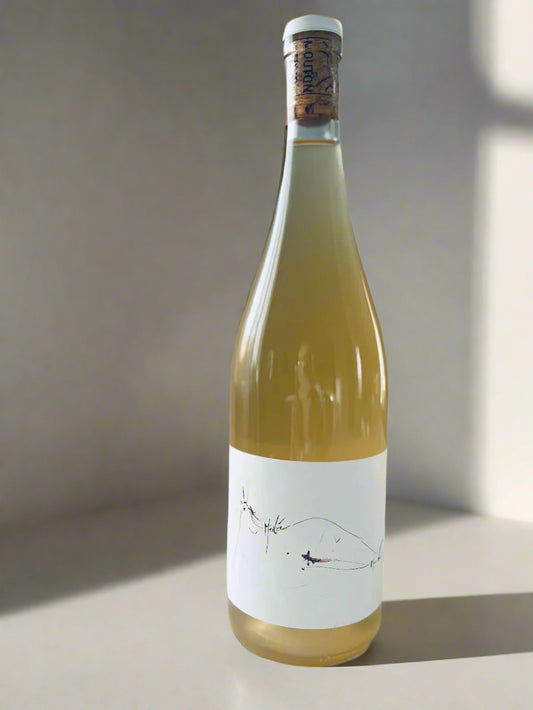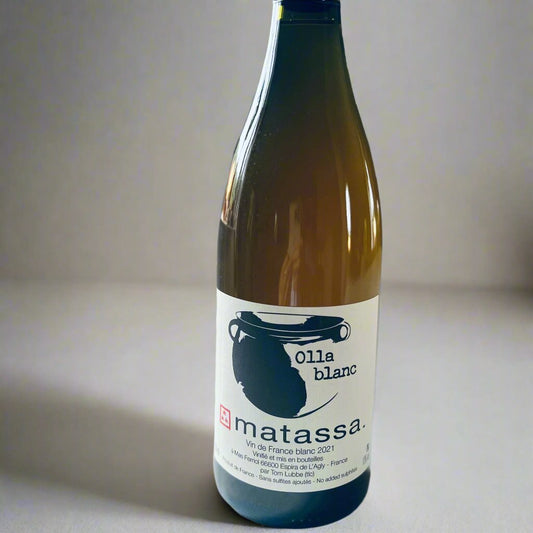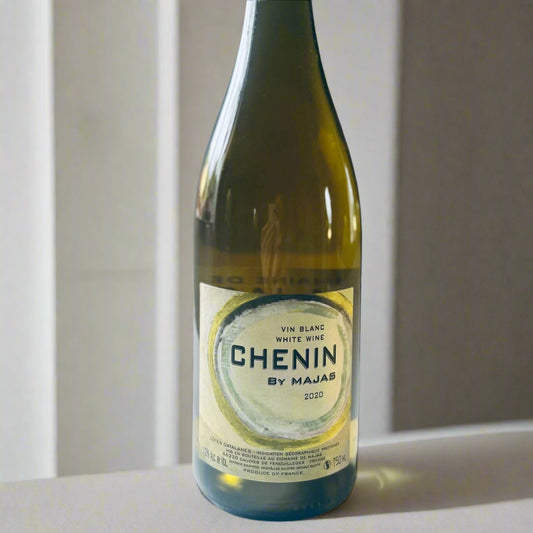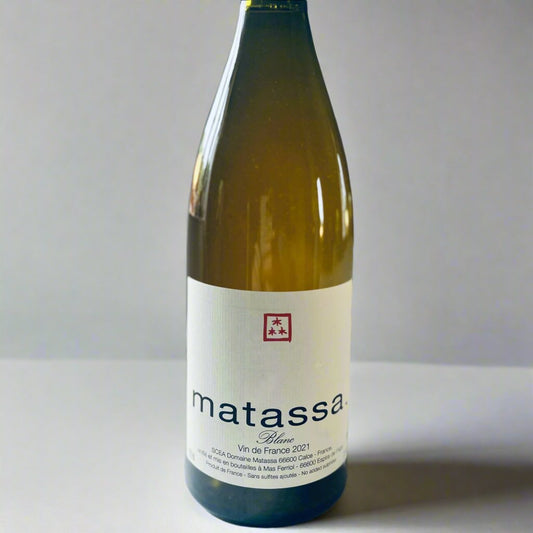Collection: Taste Union Natural Wines | Organic, Biodynamic & Sustainable Wines
Explore the world of Taste Union's natural wines, celebrating sustainability, and minimal intervention winemaking. Sourced from the picturesque vineyards of Languedoc Roussillon, these wines are crafted using organic, biodynamic, and natural techniques to reflect the true essence of the region.
Taste Union's natural wines are unfiltered and free from artificial additives, offering a vibrant and honest expression of the grapes and terroir. Expect dynamic flavours, from bright citrus and fresh orchard fruits to earthy undertones and subtle minerality, all enhanced by a commitment to sustainable practices.
Perfect for those who value pure, eco-conscious winemaking, Taste Union's natural wines pair beautifully with a variety of dishes or can be enjoyed on their own. Experience the harmony of nature and craftsmanship in every glass.
-
Matassa El Carner by Tom Lubbe | 2021 Biodynamic Natural Wine
Regular price £44.00 GBPRegular priceUnit price / per£0.00 GBPSale price £44.00 GBP -
Domaine Pion Trois Cent Vingt | 2021 Natural White Wine
Regular price £24.00 GBPRegular priceUnit price / per£0.00 GBPSale price £24.00 GBP -
Chan Chan, Lazzer | Lledoner Pelut Natural Red Wine
Regular price £32.00 GBPRegular priceUnit price / per£0.00 GBPSale price £32.00 GBP -
Mouton Noir, & Rouge by Cedric Mouton | 2022 Natural Red Wine
Regular price £24.00 GBPRegular priceUnit price / per£0.00 GBPSale price £24.00 GBP -
Face B Makéba | 2022 Natural White Wine
Regular price £33.00 GBPRegular priceUnit price / per£0.00 GBPSale price £33.00 GBP -
Mouton Noir, Petit Mouton Noir by Cedric Mouton | 2022 Natural Red Wine
Regular price £25.00 GBPRegular priceUnit price / per£0.00 GBPSale price £25.00 GBP -
Mouton Noir Les Blancs by Cedric Mouton | Natural Orange Wine 2022
Regular price £25.00 GBPRegular priceUnit price / per£0.00 GBPSale price £25.00 GBP -
Mouton Noir Médée by Cedric Mouton | 2022 Natural White Wine
Regular price £25.00 GBPRegular priceUnit price / per£0.00 GBPSale price £25.00 GBP -
Matassa Olla Blanc by Tom Lubbe | 2021 Biodynamic Natural White Wine
Regular price £29.00 GBPRegular priceUnit price / per£0.00 GBPSale price £29.00 GBP -
Matassa Olla Rouge by Tom Lubbe | 2022 Biodynamic Natural Red Wine
Regular price £29.00 GBPRegular priceUnit price / per£0.00 GBPSale price £29.00 GBP -
Mouton Noir Ananda by Cedric Mouton | 2022 Natural Red Wine
Regular price £32.00 GBPRegular priceUnit price / per£0.00 GBPSale price £32.00 GBP -
Mouton Noir Born to Be Wine by Cedric Mouton | 2022 Natural Red Wine
Regular price £32.00 GBPRegular priceUnit price / per£0.00 GBPSale price £32.00 GBP -
Matassa Ace of Spades by Tom Lubbe | Biodynamic Natural Wine from Roussillon
Regular price £37.00 GBPRegular priceUnit price / per£0.00 GBPSale price £37.00 GBP -
Matassa Romanissa by Tom Lubbe | 2021 Biodynamic Natural Red Wine
Regular price £42.00 GBPRegular priceUnit price / per£0.00 GBPSale price £42.00 GBP -
Domaine de Majas Chenin Blanc | 2020 Natural White Wine
Regular price £23.00 GBPRegular priceUnit price / per£0.00 GBPSale price £23.00 GBPSold out -
Matassa Blanc by Tom Lubbe | 2021 Biodynamic Natural White Wine
Regular price £46.00 GBPRegular priceUnit price / per£0.00 GBPSale price £46.00 GBPSold out
Unveiling the Secrets of Natural Wine: Understanding its Origins and Characteristics
Are you a wine enthusiast looking to deepen your appreciation for the complex and nuanced world of natural wine? Look no further. We peel back the curtain and unveil the secrets of natural wine, helping you understand its origins and characteristics.
Natural wine is more than just a trend; it's a philosophy. Produced without the use of chemicals, additives, or excessive manipulation, natural wine embodies the true essence of the grape and reflects the terroir in which it was grown.
We explain the history of natural wine, tracing its roots back to ancient winemaking traditions and exploring its resurgence in recent years. We explore the unique characteristics and flavours that natural wine exhibits, taking you on a sensory journey through a world of organic, low-intervention wines.
Whether you're a seasoned oenophile or are new to the world of natural wine, we will provide you with the knowledge and insights you need to appreciate and enjoy these remarkable wines to their fullest. So, grab a glass, and let's dive into the captivating world of natural wine.
What is natural wine?
Natural wine is a term that encompasses a broad spectrum of winemaking practices that emphasise minimal intervention and respect for the environment. Unlike conventional wines that often rely on additives, preservatives, and extensive manipulation, natural wines are crafted with a philosophy that prioritises authenticity and the expression of terroir. This means that the grapes used in natural wine production are typically grown organically or biodynamically, and the winemaking process seeks to harness the natural fermentation processes without the use of commercial yeast or other additives.
One of the defining features of natural wine is that it is made with grapes that have been cultivated without synthetic pesticides or herbicides. This commitment to organic farming not only promotes biodiversity and soil health but also ensures that the grapes retain their natural flavours and characteristics. The winemaker's role shifts from being a manipulator of the wine to a facilitator, allowing the grapes and the environment to guide the final product. This hands-off approach often results in wines that are unique, complex, and reflective of the specific conditions in which the grapes were grown.
Natural wines can vary widely in flavour, aroma, and texture, making them an exciting choice for adventurous wine drinkers. From light and effervescent whites to earthy and robust reds, the diversity within natural wine is a testament to its commitment to authenticity and individuality. As consumers increasingly seek out products that are not only delicious but also sustainable and ethically produced, natural wine has emerged as a compelling option in the world of viticulture.
The origins of natural wine
The roots of natural wine can be traced back thousands of years to the earliest days of winemaking. Ancient civilisations, including the Egyptians and Greeks, produced wine using grapes harvested from their vineyards, relying on natural fermentation processes without the interference of modern technology or additives. These early winemakers understood the importance of terroir and the unique characteristics imparted by their environment, creating wines that were a true reflection of their origins.
In the 20th century, the industrialisation of agriculture and advancements in winemaking technology led to the widespread adoption of chemical fertilisers, pesticides, and additives in the production of wine. As a result, many wine enthusiasts began to feel that the essence of the grape and the authenticity of the wine were being compromised. In response to this, a movement began to take shape in the late 20th century, primarily in France, where producers started to embrace traditional and sustainable farming practices. This resurgence was fueled by a growing awareness of environmental issues and a desire to return to the roots of winemaking.
The term "natural wine" began to gain traction in the early 2000s, particularly among a new generation of winemakers and consumers who prioritised organic and biodynamic methods. Pioneers in this movement, such as Marcel Lapierre and Nicolas Joly, championed the idea of letting nature take its course in the vineyard and cellar. As word spread about the unique flavours and qualities of natural wines, interest in this category grew globally, leading to the establishment of natural wine festivals and communities dedicated to celebrating and promoting these distinctive products.
The characteristics of natural wine
Natural wines are often characterised by their vibrant and expressive flavours, which can differ significantly from those found in conventional wines. The absence of additives and manipulation allows for a more authentic representation of the grape's natural characteristics, leading to a diverse range of aromas and tastes. These wines may exhibit a certain funkiness or earthiness that can be appealing to adventurous palates. The fermentation process, which often involves native yeasts, can result in a wide array of flavour profiles, from fruity and floral to savoury and herbal.
Another notable characteristic of natural wines is their tendency to have lower levels of sulphites compared to conventional wines. Sulphites are commonly used as preservatives to enhance the shelf life of wine and prevent spoilage, but in natural winemaking, the use of sulphites is minimised or eliminated entirely. This can lead to a fresher and more lively taste, though it may also result in wines that evolve more rapidly in the bottle. As such, natural wines often require a bit of care when it comes to storage and consumption, as they may be more sensitive to temperature and light.
The texture of natural wines can also be quite distinct. Many natural wines are unfiltered, which can contribute to a cloudier appearance and a more complex mouthfeel. This lack of filtration allows for a greater presence of sediment and other particles, which some drinkers appreciate as a hallmark of authenticity. The combination of vibrant flavours, lower sulphite levels, and unique textures creates a sensory experience that sets natural wines apart from their conventional counterparts, inviting drinkers to explore the myriad expressions of the grape.
The difference between natural wine and conventional wine
The distinction between natural wine and conventional wine primarily lies in the methods used during both the cultivation of grapes and the vinification process. Conventional winemaking often relies on a range of additives, including commercial yeasts, sulphites, and fining agents, to achieve a desired flavour profile and consistency. This approach can lead to wines that may taste similar regardless of their origin, as the intervention of technology and chemistry can mask the unique characteristics of the vineyard and the vintage.
Conversely, natural wine embraces a philosophy of minimal intervention, allowing the grape's natural flavours and the terroir to shine through. In natural winemaking, the focus is on organic or biodynamic farming practices, with a strong emphasis on biodiversity and ecological balance. The fermentation process typically utilises native yeasts, which can lead to a more varied and unpredictable outcome. This unpredictability is often celebrated by natural wine enthusiasts, who appreciate the unique stories that each bottle tells, reflecting the specific conditions of the grapes' growth and the winemaking process.
Another key difference is the approach to sulphites. Conventional wines often contain added sulphites to preserve freshness and prevent spoilage, while many natural wines are produced with little to no sulphites. While this can result in a more vibrant and lively wine, it may also lead to wines that are more sensitive to storage conditions and may have a shorter shelf life. The divergence in these practices highlights the fundamental philosophies underlying natural and conventional winemaking, where one seeks to enhance and stabilise while the other aims to preserve and express the innate qualities of the grape.
The benefits of drinking natural wine
Drinking natural wine comes with a variety of benefits, both for the individual and the environment. One of the most significant advantages is the reduced exposure to chemicals and additives. Many consumers are increasingly concerned about what they put into their bodies, and natural wines offer a cleaner, more organic alternative. By choosing natural wine, drinkers can enjoy a product that is not only environmentally friendly but also aligns with their values regarding health and sustainability.
Another benefit of natural wine is the opportunity to explore new and diverse flavour profiles. Natural wines often display a wide range of aromas and tastes that can differ greatly from conventional wines. This diversity invites wine enthusiasts to expand their palates and discover unique expressions of grape varieties and terroirs. Many natural wines are also produced in small batches, leading to limited releases that provide a sense of exclusivity and excitement for those who partake in them. Each bottle tells a story, making the experience of drinking natural wine more engaging and personal.
Moreover, supporting natural winemakers often means supporting sustainable agricultural practices. Many natural wine producers prioritise biodiversity and ecological balance in their vineyards, contributing to healthier ecosystems. By choosing natural wine, consumers can play a role in promoting these sustainable practices and supporting local farmers and artisans. This conscious consumption fosters a deeper connection not only to the wine itself but also to the people and environments behind its production.
The process of making natural wine
The process of making natural wine begins in the vineyard, where the focus is on cultivating grapes using organic or biodynamic methods. This involves nurturing the soil, promoting biodiversity, and minimising the use of synthetic chemicals. The goal is to create a healthy ecosystem that allows the vines to thrive naturally. Harvesting is typically done by hand, ensuring that only the best grapes are selected for winemaking. This hands-on approach reflects the commitment of natural winemakers to produce high-quality wines that truly represent their origins.
Once the grapes are harvested, the winemaking process emphasises minimal intervention. In many cases, natural winemakers will allow for spontaneous fermentation, using the native yeasts present on the grape skins, rather than relying on commercial yeast strains. This can lead to a more authentic expression of the grape and the terroir, though it also introduces an element of unpredictability. During fermentation, winemakers may choose to use whole clusters of grapes or crush them, depending on the desired style of the wine.
After fermentation is complete, natural wines are typically aged in neutral vessels, such as old oak barrels or stainless steel tanks, which do not impart additional flavours to the wine. Fining and filtration processes are often minimal or nonexistent, preserving the wine's natural character and mouthfeel. The final product may contain fewer sulphites compared to conventional wines, reflecting the natural winemaker's dedication to authenticity. This process culminates in a wine that is unique and expressive, capturing the essence of the grapes and the vineyard in which they were grown.
Common misconceptions about natural wine
Despite the growing popularity of natural wine, several misconceptions continue to persist among consumers. One common belief is that all natural wines are "funky" or flawed. While it's true that natural wines can exhibit unique and sometimes unconventional flavours, this does not imply that they are spoiled or poorly made. The "funk" often associated with natural wine can be a result of the wild fermentation process, which can introduce a range of complex aromas. However, many natural wines are also beautifully balanced and harmonious, showcasing the grape's true potential.
Another misconception is that natural wine lacks consistency. Critics may argue that the unpredictability of natural fermentation can lead to wines that are inconsistent from bottle to bottle. While it is true that natural wines can vary based on vintage and winemaking practices, many producers strive for a signature style that reflects their philosophy and the specific characteristics of their vineyards. Moreover, the variations found in natural wines can be seen as an opportunity to explore the unique terroir and vintages, offering a rich tapestry of flavours and experiences.
Lastly, some consumers may believe that natural wines are only for niche markets or that they are overly complicated. While natural wine can be intricate, the essence of enjoying it lies in the experience of tasting and exploring. Many natural wine producers are passionate about sharing their creations and are more than willing to guide consumers through the unique aspects of their wines. With a growing number of resources available, including wine bars and shops that specialise in natural wines, it's becoming increasingly accessible for everyone to enjoy and appreciate this vibrant category.
How to choose and buy natural wine
Choosing and buying natural wine can be an exciting journey, but it may also require some guidance, especially for those new to the category. One of the first steps is to seek out reputable retailers or wine shops that specialise in natural wines. These establishments often have knowledgeable staff who can provide insights into the different producers, regions, and styles available. They can help you navigate the selection and recommend bottles based on your taste preferences, whether you enjoy light, fruity whites or bold, tannic reds.
When selecting natural wine, it's essential to pay attention to the producer's philosophy and practices. Look for wines that are certified organic or biodynamic, as these designations indicate a commitment to sustainable farming practices. Additionally, many natural wine producers will openly share their winemaking methods on their labels or websites, providing transparency about their processes. This information can help you make informed choices and connect with producers whose values align with your own.
Tasting before buying can also be beneficial, and many wine bars and shops host natural wine tastings or events. This allows you to sample a variety of wines, helping you discover what you enjoy. Keep an open mind and be willing to try new styles and regions, as the beauty of natural wine lies in its diversity. Whether you're purchasing a bottle for a special occasion or simply to enjoy at home, the journey of exploring natural wines can be as rewarding as the wine itself.
Pairing natural wine with food
Pairing natural wine with food can elevate your dining experience, enhancing both the wine and the dish. Due to the unique flavour profiles of natural wines, they can often complement a wide range of cuisines and ingredients. For example, light and crisp natural whites, such as those made from Sauvignon Blanc or Chenin Blanc, can pair beautifully with seafood, salads, and light pasta dishes. Their acidity and freshness can accentuate the flavours of the food, creating a harmonious balance on the palate.
Red natural wines, particularly those with earthy or fruity characteristics, can be matched with heartier dishes. A natural Pinot Noir, for instance, can complement roasted chicken, duck, or mushroom risotto, while a robust natural Syrah can stand up to grilled meats and rich stews. The key is to consider the weight and flavour profile of both the wine and the food, seeking out pairings that enhance rather than overpower each other.
Cheese and charcuterie boards are also excellent opportunities to explore natural wine pairings. The diverse flavours of artisanal cheeses and cured meats can be beautifully complemented by natural wines, particularly those that exhibit savoury or herbal notes. Consider serving a slightly chilled natural red with a selection of aged cheeses or a vibrant white with fresh, soft cheeses. The versatility of natural wine allows for creativity in pairing, inviting you to experiment and discover new combinations that delight the senses.
The future of natural wine
The future of natural wine appears bright, as more consumers become aware of the benefits and unique qualities associated with these wines. With the growing emphasis on sustainability and environmental consciousness, natural wine aligns well with the values of a new generation of wine drinkers who prioritise organic and local products. As awareness continues to spread, we can expect to see an increase in the number of producers embracing natural winemaking practices, further enriching the diversity of options available in the market.
Additionally, the establishment of natural wine communities and festivals has fostered a sense of camaraderie among producers and consumers alike. Events dedicated to celebrating natural wine provide opportunities for education, exploration, and connection, allowing enthusiasts to share their passion and knowledge. As more people engage with natural wine culture, the understanding of its complexities and the appreciation for its authenticity will continue to grow.
Moreover, as technology advances, natural winemakers are finding innovative ways to improve their processes while remaining true to their principles. Enhanced understanding of fermentation and environmental management can lead to even better quality wines without compromising the natural ethos. The future of natural wine is not only about preserving the past but also about looking forward to a new era of winemaking that values sustainability, authenticity, and the incredible diversity of flavours that nature has to offer.


